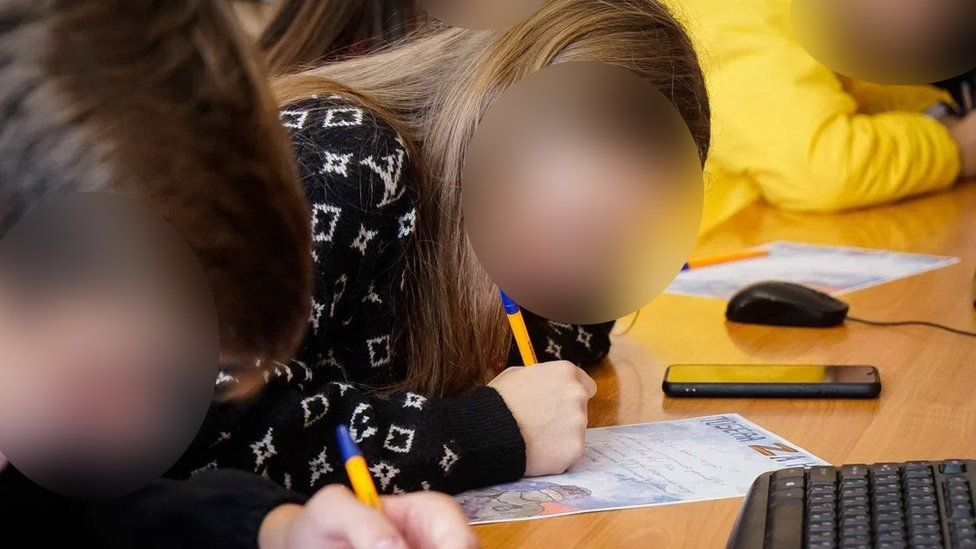Secret Ukrainian school in Russian-occupied territory
Similar to millions of other Ukrainians, Nataliia (pseudonym) was compelled to flee her home in the initial stages of Russia’s full-scale invasion of Ukraine.
Unable to endure life under Russian occupation in her southern hometown of Melitopol, she believed she could better contribute in areas still under Ukrainian control.
However, Nataliia’s departure from her home and separation from her family was not the only sacrifice she made; she also relinquished her two-decade-long career as a teacher. Now, she dedicates her time to conducting online classes for hundreds of her former students.
The challenges she faces, along with the risks for her and her virtual classroom, are immense.
“Nobody had attempted anything like this previously,” Nataliia explains. “Not in Crimea, nor in the occupied regions of Donbas, Kherson, or Zaporizhzhia.”
In Nataliia’s former classrooms in Melitopol, portraits of Vladimir Putin now adorn the walls. The students are compelled to learn and sing the Russian national anthem, and they are even coerced into penning “motivational letters” to Russian soldiers.
This is how Ukrainian children are educated in territories under Russian occupation. They are indoctrinated with the belief that Ukraine is not a legitimate nation-state. Nataliia asserts that if a child questions the curriculum, their parents are threatened with violence or torture.
This dire situation prompted Nataliia and her former colleagues to establish an online teaching platform with the aim of “preserving the minds of Ukrainian children.”
“Once we launched it, I wrote a neutral letter, offering the classes to all of the parents,” explains Nataliia. “I didn’t know who was pro-Ukrainian or pro-Russian, and they knew my home address and my relatives”.
She says even uttering the word “occupation” can result in Russian authorities visiting your home. If there is any evidence of loyalty to Ukraine, such as a child’s homework being written in Ukrainian instead of Russian, a trip to the police station could follow.
And yet, hundreds of families have taken up Nataliia’s offer to teach the Ukrainian curriculum – and numbers are growing.
In the morning, they attend Russian school, and in the afternoon or evening, the pupils have secret online lessons with Ukrainian teachers.
“Safety is more important than knowledge. All the students join with their cameras off and use false nicknames,” says Nataliia.
Recordings are provided for those who might not have a signal or power.
“It’s not so important to teach children what year Taras Shevchenko [a famous Ukrainian poet] was born, or the rules of geometry, but to keep them connected with Ukrainian culture,” she explains.
“I have one student who came home and cried after the Russian lessons. This is too much psychological pressure for a child. All their lives they lived in a Ukrainian environment – and suddenly, everything changed.”
Valera (not his real name) goes to a Russian school but also attends online Ukrainian classes. The 14-year-old told us only six out of his 31 classmates support Ukraine. He says he tries to resist Russification when he can.
“Once we turned on the Ukrainian anthem during our lesson, on the phone,” he recalls. “Then they started to search everyone. I hid my phone; once they played their anthem – everyone stood up, and we remained seated.”
He says he always wanted this additional Ukrainian teaching, but Valera believes he is going to be made to join the Russian army.
Nataliia concedes the purpose of her teaching is constantly tested. The longer Russia occupies Melitopol, the greater the risk children living there will be indoctrinated.
“I can’t check their homework normally,” she says. “I fear for our future generation. It’s very important to keep these children connected to reality. But it is so difficult to do.”


